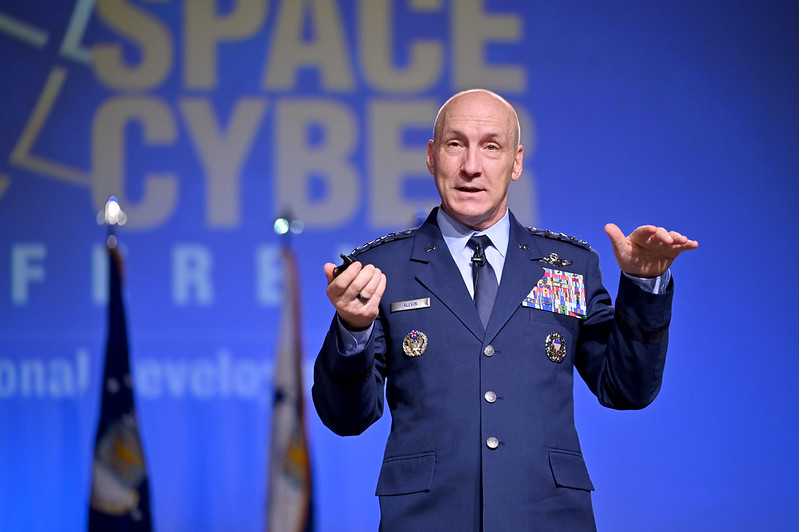CSAF, CMSAF Discuss Leadership with Cadets at AFA Conference
September 30, 2024 | By Juanita Henry
The Air & Space Forces Association’s Doolittle Leadership Center (DLC) hosted its third Senior Mentorship for Junior Leaders session at the 2024 Air, Space & Cyber Conference. The event provided some 150 cadets and Silver Wings attendees a unique opportunity to engage with senior Air Force leaders.
Held at the Gaylord National Resort & Convention Center in National Harbor, Maryland, the invite-only session included discussions on how junior officers can prepare for the complex challenges they will face in their careers.
Col. Patrick Donley, USAF (Ret.), Director of the DLC, opened the session with a warm welcome to cadets and expressed his gratitude to the event co-sponsor, Columbia Southern University, and founding partner, Pentagon Federal Credit Union, for their continued support. He emphasized the importance of collaboration in providing educational opportunities for Airmen and Guardians.
Chief of Staff of the Air Force Gen. David W. Allvin, and Chief Master Sergeant of the Air Force David A. Flosi delivered leadership insights that framed the event’s focus.
As a seasoned leader with more than 4,600 flight hours in more than 30 aircraft, including 100 combat hours and over 800 flight test hours, Allvin emphasized the shifting nature of global power dynamics. He noted that today’s cadets face a far more unpredictable path than previous generations, urging them to embrace intellectual curiosity and adaptability as essential tools for success.
“We’re all changing together, and that requires something a little bit different … [My advice to you is to] be intellectually curious., to be invested in all of what’s going on in the world in a way that I wasn’t at the time, and understand that things are moving really fast,” Allvin said.
Flosi echoed these sentiments. Drawing from his personal experiences in deployments and leadership roles, he emphasized teamwork, critical thinking, and leadership as essential skills for overcoming challenges.
The secret to success is “our ability to think critically, to lead, to manage through difficult situations, and to be agile in difficult environments,” Flosi said. “As the General is describing, those environments are evolving in a way that we have not experienced.”
Both leaders encouraged junior officers to be open to learning from their senior counterparts while also contributing innovative ideas.
The session featured an interactive Q&A where cadets had the rare opportunity to ask questions, seek advice, and gain insight directly from the Air Force’s top leaders.
A cadet from the University of Oklahoma asked Allvin about the efforts of other military branches, such as the Army, Navy, and Marine Corps, in adapting to the evolving geopolitical environment, particularly in relation to China. Allvin elaborated on joint military efforts, stressing that air and space superiority remain critical in addressing rapidly changing global threats.
“I would contend that the relevance of the Air Force and the Space Force to the joint force is greater than any of the other shirts,” Allvin stated.
He highlighted that while the Navy and Marine Corps play significant roles, particularly in the Indo-Pacific region, their scale of contribution differs from that of the Air Force and Space Force. Each branch, he explained, is adapting in its own way, with the Navy redesigning its forces and the Army updating its strategies to meet future demands.
“We want to make sure that we don’t all try and do the same thing, so there is an integration that needs to happen. I think all the services are changing. I think our Air Force needs to change the fastest because I do believe we’re the [strongest],” Allvin said.
A cadet from Miami, Florida, asked Flosi, “What are some ways new lieutenants can embrace change and advocate for our enlisted?”
“One of the best things you can do is listen more than you talk. I’m not joking,” Flosi replied. “You have access to deep experience and knowledge among the force, whether commissioned, civilian, or enlisted. I often tell other senior NCOs to look for the most valuable person in the room. Some might point to the Chief of Staff, but in reality, the ones worth investing in are the youngest among us. That’s where the future is.”
He encouraged new leaders to be curious, to participate in conversations, and to seek out the experiences of others. Flosi pointed out that small things like showing up on time with a good attitude already can set someone apart. While proficiency in the job will come with time, he emphasized that it’s the willingness to learn, to be part of the team, and to maintain a professional curiosity that matters most early on.
As the session ended, the conversation shifted toward future challenges, particularly the integration of human-machine teaming in combat operations. The speakers stressed the need for speed and agility in decision-making and the growing importance of leveraging algorithms and advanced technologies to enhance operational capabilities.
While technology plays an increasingly critical role, Allvin and Flosi emphasized the irreplaceable value of human judgment.
The Doolittle Leadership Center’s mentorship program continues to provide invaluable opportunities for cadets to learn directly from senior leaders. As the Air and Space Forces adapt to rapidly changing global dynamics, events like this help prepare the next generation of officers to lead with confidence, resilience, and foresight.
“Now in its third offering, the ‘Senior Mentorship for Junior Leaders’ session has become an AFA conference highlight for senior leaders and cadets alike,” Donley said. “Each session has attracted greater cadet involvement from a larger number of officer candidate programs around the country. This year we were really encouraged to be joined by such a supportive, like-minded partner in Columbia Southern University to make this event a reality!“

